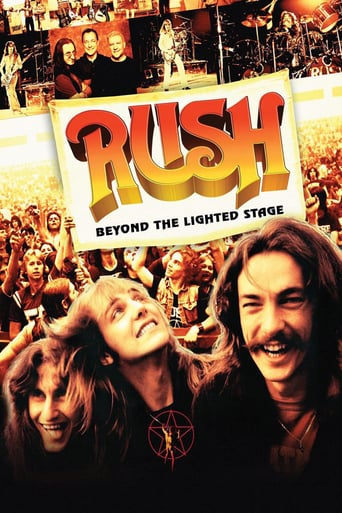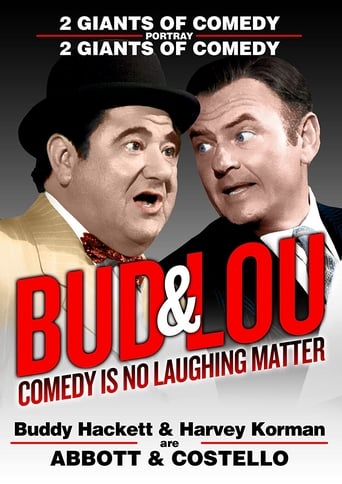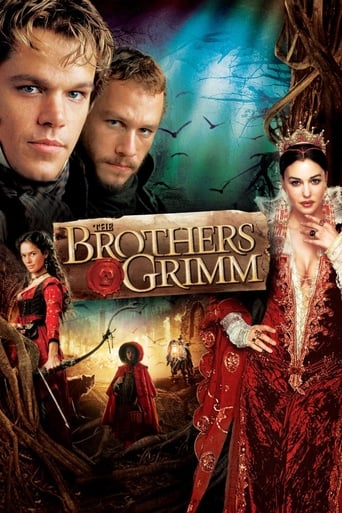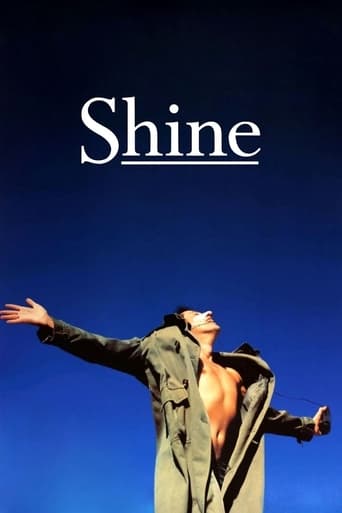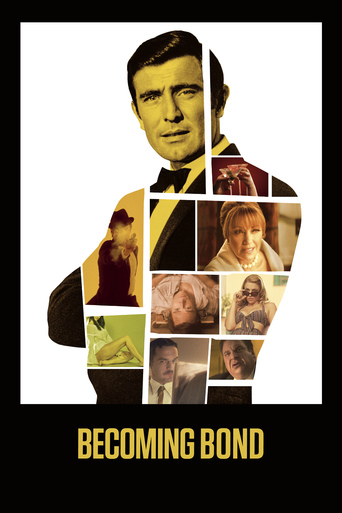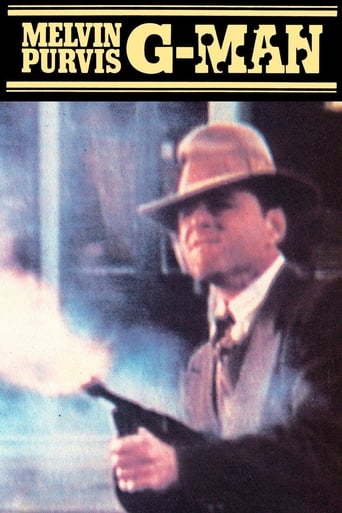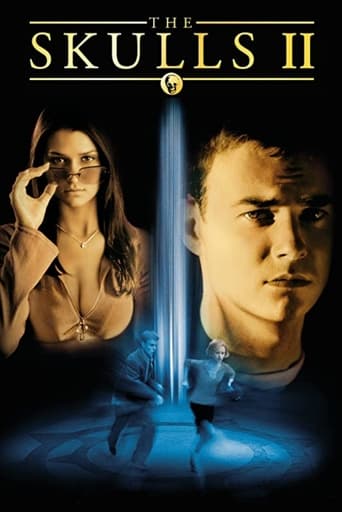Rush: Beyond The Lighted Stage (2010)
An in-depth look at the Canadian rock band Rush, chronicling the band's musical evolution from their progressive rock sound of the '70s to their current heavy rock style.
Watch Trailer
Cast


Similar titles
Reviews
The film takes a three-pronged approach. First, there are interviews done in contemporary time, with the three principals of Rush, and well-known musicians who admire them, or were influenced by them. Second, there are interviews with family, handlers, and music industry associates. Third, there are many archival clips of live performances of Rush.Their growth from getting their first radio play in Cleveland to being well-known was quite engaging; the first hour slipped by quickly, going from nowhere to the album Moving Pictures. Then the issue of dealing with fame started to come in. Fan interaction rose strongly. Alex and Geddy were fine with that, but Neil was more of a private person and avoids interactions.The band's character and their fans' characteristics are compared in lots of detail. Neil was the principal lyricist, and his special talent seems to be reflecting his deep literacy in terms that just about anyone can understand. Further, their music tends to be complex, yet still accessible.In the eighties, the group switched producer and instruments toward synthesizers, electronic drumsets, and keyboards. They trended toward shorter songs with less complexity, less bass, and more keyboard. Some of their fans drifted away, many others did not.As one of their industry admirers put it, there were different periods of Rush, and that is one of the things that makes them interesting. Toward the end of the eighties, they switched producers again, and went back into being a 'power trio' again, but in the current context.Around 1997, Neil's daughter died in an accident, and his wife passed from illness not too long after. He embarked on a long trip on motorcycle (55k miles). The band shutdown while Neil healed.When Neil returned, there was a period of getting his chops back. They recorded a new album; they went on the road again. The band was rejuvenated, and traveled to places where they had ever been before, to large audiences. In the 21st century, some of their fans from the seventies celebrate them: the makers of South Park and Steven Colbert, for instance.Up to the time the documentary was made, the band was going strong. As Geddy said at one point, Rush is the world's most popular cult band.-----Scores-----Cinematography: 9/10 Nicely done. The archival footage clips look like the eras they came from, but the current interviews looks sharp and well-produced.Sound: 10/10 Seldom disappoints. I wish there had been more concert footage, but the exposition was too good to be omitted.Acting: z/10 Not really applicable here.Screenplay: 10/10 Well-organised, well-presented, and rich in the level of information that it presents.
I first got into Rush when I was 15 back in 1987 when a friend of mine left me a cassette with Signals on one side and Power Windows on the other. I had heard the name of the band before but that was it. I listened to that tape and immediately loved Signals - Power Windows not so much. I remember not actually being able to determine if the vocalist was male or female, which intrigued me. But I loved the synth-heavy, slightly fuzzy sound of Signals and I began playing it more or less on repeat and for the next couple of years became a Rush obsessive. At the dawn of the 90's my tastes changed and I moved on to alternative rock but as the years progressed I returned to some of my favourite Rush albums and still enjoy them quite a bit. For the record my favourite Rush period is the early 80's.As a result, it was with some enthusiasm that I went into this documentary. It was like visiting old friends from the past, ones whom you only really have good memories of. Strangely enough, it was only once the film was underway did I actually realise just how little I knew about the band beyond the music. You just never saw them interviewed too often, so it was genuinely surprising to see them talk freely. For instance, I had never really realised that they abstained from rock 'n' roll excesses as much as they did, nor did I realise Neil Peart was so socially awkward. Details like these were fascinating to learn, I mean it is an achievement of sorts for a rock band active in the 70's and 80's to have been faithful husbands and to have avoided Class A narcotics! I guess it shows that Rush were no ordinary rock band. This was part of why they were so derided of course. The music press painted them as thoroughly uncool and preposterous. And I suppose they did appeal a lot to music fans who may have been disproportionately more on the geeky side. But on the other hand, they lasted the test of time and some of their music remains absolutely inspired. In particular their unique early 80's fusion of prog-rock, hard rock and new wave was entirely original and didn't sound in the least bit forced.The documentary charts their progress from their earliest origins as a late 60's school band to the present day. Unlike most rock bands there isn't a lot of drama and excess in the Rush story. These are grounded and likable individuals who are just too normal for anything too Spinal Tap-ish to happen. The only event that really went beyond the music and into real life tragedy was the deaths of Peart's daughter and wife in quick succession. This awful event isn't really dwelled on here though. Mostly this is about the music. Most of the albums are covered in at least some detail, so this is great for fans of the group. Also, of great interest is the input of their many famous fans. There are talking heads segments from the likes of Kirk Hammett, Gene Simmons, Trent Reznor, Jack Black, Sebastian Bach and Billy Corgan among others. It was fascinating to hear what this wide ranging selection of folks had to say. Corgan and Reznor were particularly considered in their observations. I guess what it also showed was the influence of the band, as these were two respected figures of alternative rock and not guys who would necessarily be obvious descendants of Rush. And not only this, there was recent footage of one of their shows in Brazil. The energy of the crowd and the band was pretty impressive for a veteran rock band. I guess Rush still lives on as perhaps the biggest underground rock band of them all...
A documentary about the epic career of Canadian rock trio Rush, who formed in 1968, have had the same lineup since 1974, and are still touring and recording thirty-six years and nineteen albums later.First, an objectivity disclaimer - Rush are probably my favourite band, so I guess I'm maybe not the best person to review this informative and amusing biography of their contribution to rock music. There are certainly a lot of intriguing questions to ask - why are they not better known, given that they've had more consecutive gold records than anyone bar The Beatles and The Rolling Stones ? How did they manage to stay together so long ? How have they have retained such an original sound despite almost constant change and progression in their musical style ? Why don't girls like them ? The film is a conventional but agreeable mix of interviews, performance footage and comments from key collaborators and some of the many artists they've influenced (Billy Corgan from The Smashing Pumpkins is particularly insightful). What's especially nice for Rush fans is that there's plenty of rare material (such as a home movie of a teenage Alex) and lengthy discussions with all three, including the notoriously camera-shy Neil. Whether you like Rush or not, the specific niche they've created is interesting. They're full-on rockers but they are neither tattooed hedonists nor art college politicos. They're consummate musicians and entertainers, but they don't seem to be in the least bit motivated by fame, popularity or wealth. They've never really had any kind of media profile and yet ever show they play is sold out. To borrow a phrase from Butch Cassidy And The Sundance Kid, who are those guys ? Their music seems totally unique to me but I don't think I can really explain why, it's just something I feel in my heart. The documentary (and the band itself) isn't afraid to poke fun at their nerdy image, fashion blunders and frequent savaging by the music press, but it also showcases their originality, commitment to what they do and respect for their audience. For a band who can often be labelled pretentious, that's really the one thing they never are, and that's what comes across here. If I have one criticism, it's the pacing - inevitably for such a long-lived act, it's hard to devote time to all their work and the mid-to-late period (encompassing albums like Hold Your Fire or Roll The Bones) suffer very brief analysis. Engagingly filmed by Banger Productions' Dunn and McFadyen, who also made the equally enjoyable Iron Maiden: Flight 666. I saw this in my local arts cinema and the small venue was packed with Rush addicts enjoying every moment, and that kind of sums this band up - you either totally get what they're doing or you just can't see it, there's no middle ground. If you're any kind of rock fan at all, and especially if you don't know Rush, don't miss this terrific little flick. From the point of conception to the moment of truth, at the point of surrender to the burden of proof, from the point of ignition to the final drive the point of the journey is not to arrive ...
This film does a good job of presenting and explaining what Rush is all about, and how the group has earned respect from fans, producers, DJs and other musicians (just not critics). Not quite hagiography, as it quotes some of the negative reviews and the band's own dissatisfaction with some of their albums or directions or even wardrobe choices.Unlike the filmmakers' heavy metal survey films (Headbanger's Journey and Global Metal), in this film Dunn is never on screen and is only heard once or twice asking questions of interview subjects. The spotlight (or limelight) is clearly placed on the band - this is a straight-up documentary, without dwelling on a fan's relationship to a band or genre. As in previous films by this team, the interviews with a surprisingly wide variety of subjects provide much of the meat of this film, giving a broad perspective and keeping it from having too much of a narrow viewpoint. Of course at least half the interviews are with Rush members themselves. You get a real sense of the men behind the music, including their relationships to each other, family, other musicians, and fans. A special aspect is some great earlier footage, even from family discussions while they were still in high school. There are also some powerful landscape shots while exploring Peart's response to deaths in his immediate family. And the examination of the song-writing process, including shots of original hand-written lyrics drafts, provides good value for viewers.Overall, a well-made film that does justice to the topic. Not as poignant or story-arced as Anvil: the Story of Anvil, this film has a more successful subject and didn't need to become a real-life Spinal Tap to make a interesting watch.

